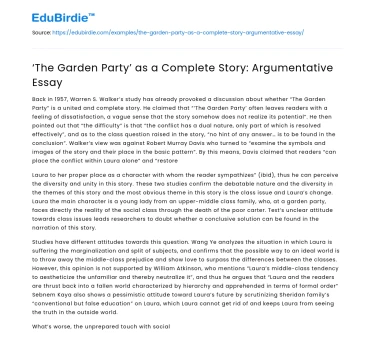Back in 1957, Warren S. Walker’s study has already provoked a discussion about whether “The Garden Party” is a united and complete story. He claimed that “‘The Garden Party’ often leaves readers with a feeling of dissatisfaction, a vague sense that the story somehow does not realize its potential”. He then pointed out that “the difficulty” is that “the conflict has a dual nature, only part of which is resolved effectively”, and as to the class question raised in the story, “no hint of any answer… is to be found in the conclusion”. Walker’s view was against Robert Murray Davis who turned to “examine the symbols and images of the story and their place in the basic pattern”. By this means, Davis claimed that readers “can place the conflict within Laura alone” and “restore
Laura to her proper place as a character with whom the reader sympathizes” (ibid), thus he can perceive the diversity and unity in this story. These two studies confirm the debatable nature and the diversity in the themes of this story and the most obvious theme in this story is the class issue and Laura’s change. Laura the main character is a young lady from an upper-middle class family, who, at a garden party, faces directly the reality of the social class through the death of the poor carter. Text’s unclear attitude towards class issues leads researchers to doubt whether a conclusive solution can be found in the narration of this story.
Save your time!
We can take care of your essay
- Proper editing and formatting
- Free revision, title page, and bibliography
- Flexible prices and money-back guarantee
Studies have different attitudes towards this question. Wang Ye analyzes the situation in which Laura is suffering the marginalization and split of subjects, and confirms that the possible way to an ideal world is to throw away the middle-class prejudice and show love to surpass the differences between the classes. However, this opinion is not supported by William Atkinson, who mentions “Laura’s middle-class tendency to aestheticize the unfamiliar and thereby neutralize it”, and thus he argues that “Laura and the readers are thrust back into a fallen world characterized by hierarchy and apprehended in terms of formal order” Sebnem Kaya also shows a pessimistic attitude toward Laura’s future by scrutinizing Sheridan family’s “conventional but false education” on Laura, which Laura cannot get rid of and keeps Laura from seeing the truth in the outside world.
What’s worse, the unprepared touch with social reality may cause Laura to change into “an uncertain, inconsistent and vulnerable adult”.
Did you like this example?
Make sure you submit a unique essay
Our writers will provide you with an essay sample written from scratch: any topic, any deadline, any instructions.
Cite this paper
-
APA
-
MLA
-
Harvard
-
Vancouver
‘The Garden Party’ as a Complete Story: Argumentative Essay.
(2022, September 27). Edubirdie. Retrieved December 27, 2024, from https://edubirdie.com/examples/the-garden-party-as-a-complete-story-argumentative-essay/
“‘The Garden Party’ as a Complete Story: Argumentative Essay.” Edubirdie, 27 Sept. 2022, edubirdie.com/examples/the-garden-party-as-a-complete-story-argumentative-essay/
‘The Garden Party’ as a Complete Story: Argumentative Essay. [online].
Available at: <https://edubirdie.com/examples/the-garden-party-as-a-complete-story-argumentative-essay/> [Accessed 27 Dec. 2024].
‘The Garden Party’ as a Complete Story: Argumentative Essay [Internet]. Edubirdie.
2022 Sept 27 [cited 2024 Dec 27].
Available from: https://edubirdie.com/examples/the-garden-party-as-a-complete-story-argumentative-essay/
copy






 Stuck on your essay?
Stuck on your essay?

